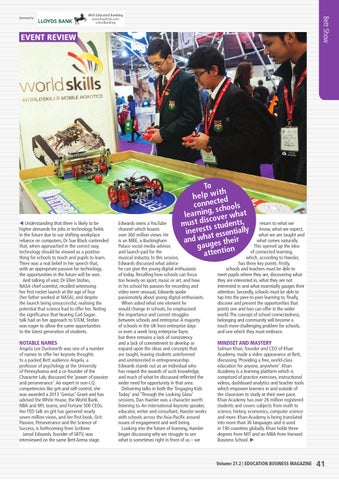Well Educated Banking www.lloydstsb.com/ schoolbanking
Bett Show
Sponsored by
EVENT REVIEW
Understanding that there is likely to be higher demands for jobs in technology fields in the future due to our shifting workplace reliance on computers, Dr Sue Black contended that, when approached in the correct way, technology should be viewed as a positive thing for schools to teach and pupils to learn. There was a real belief in her speech that, with an appropriate passion for technology, the opportunities in the future will be vast. And talking of vast, Dr Ellen Stofan, NASA chief scientist, recalled witnessing her first rocket launch at the age of four (her father worked at NASA), and despite the launch being unsuccessful, realising the potential that science had to offer her. Noting the significance that hearing Carl Sagan talk had on her approach to STEM, Stofan was eager to allow the same opportunities to the latest generation of students. NOTABLE NAMES Angela Lee Duckworth was one of a number of names to offer her keynote thoughts to a packed Bett audience. Angela, a professor of psychology at the University of Pennsylvania and a co-founder of the Character Lab, discussed the ‘power of passion and perseverance’. An expert in non-I.Q. competencies like grit and self-control, she was awarded a 2013 ‘Genius’ Grant and has advised the White House, the World Bank, NBA and NFL teams, and Fortune 500 CEOs. Her TED talk on grit has garnered nearly seven million views, and her first book, Grit: Passion, Perseverance and the Science of Success, is forthcoming from Scribner. Jamal Edwards, founder of SBTV, was interviewed on the same Bett Arena stage.
To ith help w ted connec chools ,s learningcover what s return to what we must dits students, know, what we expect, s e y iner t essentiall what we are taught and a what comes naturally. and wh ges their This opened up the idea gau tion of connected learning, atten
Edwards owns a YouTube channel which boasts over 360 million views. He is an MBE, a Buckingham Palace social media advisor, and launch-pad for the musical industry. In this session, Edwards discussed what advice he can give the young digital enthusiasts of today. Recalling how schools can focus too heavily on sport, music or art, and how in his school his passion for recording and video were unusual, Edwards spoke passionately about young digital enthusiasts. When asked what one element he would change in schools, he emphasised the importance and current struggles between schools and enterprise. A majority of schools in the UK host enterprise days or even a week long enterprise fayre, but there remains a lack of consistency and a lack of commitment to develop or expand upon the ideas and concepts that are taught, leaving students uninformed and uninterested in entrepreneurship. Edwards stands out as an individual who has reaped the awards of such knowledge, and much of what he discussed reflected the wider need for opportunity in that area. Delivering talks in both the ‘Engaging Kids Today’ and ‘Through the Looking Glass’ sessions, Dan Haesler was a character worth listening to. An international keynote speaker, educator, writer and consultant, Haesler works with schools across the Asia-Pacific around issues of engagement and well-being. Looking into the future of learning, Haesler began discussing why we struggle to see what is sometimes right in front of us – we
which, according to Haesler, has three key points. Firstly, schools and teachers must be able to meet pupils where they are, discovering what they are interested in, what they are not interested in and what essentially gauges their attention. Secondly, schools must be able to tap into the peer‑to‑peer learning to, finally, discover and present the opportunities that points one and two can offer in the wider world. The concept of school connectedness, belonging and community will become a much more challenging problem for schools, and one which they must embrace. MINDSET AND MASTERY Salman Khan, founder and CEO of Khan Academy, made a video appearance at Bett, discussing ‘Providing a free, world-class education for anyone, anywhere’. Khan Academy is a learning platform which is comprised of practice exercises, instructional videos, dashboard analytics and teacher tools which empower learners in and outside of the classroom to study at their own pace. Khan Academy has over 26 million registered students and covers subjects from math to science, history, economics, computer science and more. Khan Academy is being translated into more than 36 languages and is used in 190 countries globally. Khan holds three degrees from MIT and an MBA from Harvard Business School. E
Volume 21.2 | EDUCATION BUSINESS MAGAZINE
41
